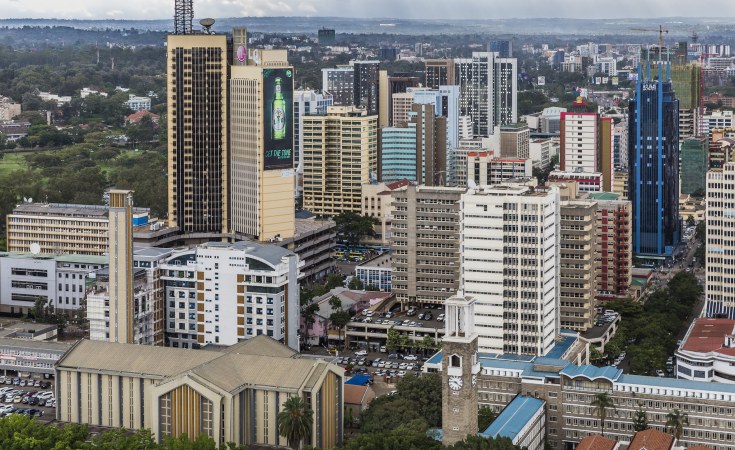$1 spent on climate adaption can yield up to $10, not to mention immeasurable other benefits, yet efforts remains chronically underfunded.
Morocco's Marrakech is a magical place for tourists from around the world. This month, the hope is that it will deliver something magical for its fellow Africans at the upcoming World Bank annual meetings. This anticipated gathering will witness the global fraternity descending upon the Ochre City to contemplate the pressing global financial situation.
In Africa, the need to urgently scale up climate adaptation finance is a matter of profound and urgent importance that looms large over the region. A new report by the Global Centre on Adaptation finds that the continent is projected to lose up to $6 trillion in economic gains by 2035 due to a lack financing to help communities reduce risks from climate hazards.
Africa's adaptation efforts have long been chronically underfunded. Current adaptation finance flows total roughly $11.4 billion per annum despite needs being closer to $53 billion per annum. Experts suggest that over $100 billion per year must be channelled to Africa by 2035 yet funds currently earmarked for adaptation projects in Africa are just a fraction of this. This is a particularly great loss given that every dollar spent on adaptation can yield a return ranging from $2 to $10.
Several factors contribute to this funding chasm. Firstly, global climate action - and therefore finance - is overwhelmingly skewed towards mitigation (i.e. the cutting of emissions) rather than adaptation. While both are crucial, the imbalance is stark. Secondly, navigating the bureaucratic labyrinth of international climate finance is challenging for African nations, given the stringent criteria and complex application processes. Thirdly, while adaptation projects have immeasurable long-term social, economic, and environmental benefits, they rarely promise immediate returns, making them less attractive to private investors.
Policymakers have had numerous opportunities this year to galvanise a change in the global financing ecosystem but have ultimately disappointed. The main mandate of the Paris Climate Finance Summit in June, for instance, was to catalyse innovative climate financing and foster private sector investments to unlock developmental pathways in the Global South. Yet very few real commitments were made.
This September, the inaugural Africa Climate Summit concluded with the adoption of the Nairobi Declaration. This statement highlights the continent's specific vulnerabilities and the urgent need for global cooperation but, overall, fails to raise ambition or provide substantive depth on adaptation issues, particularly finance. For example, while the declaration calls on the global community to honour the $100 billion annual climate pledge, it fails to echo similar sentiments for them to uphold their commitment at COP26 to double adaptation finance or call for a drastic increase in quality and reliable finance. Gendered impacts of the climate crisis are also largely overlooked, land rights are notably absent, and equally problematic is the reference to the new Africa Carbon Markets Initiative. Carbon markets are a dangerous and short-sighted false solution that offers companies permits to pollute.
The World Bank meetings thus offer world leaders a unique opportunity to learn from past mistakes and set the stage for success ahead of COP28 by implementing a new global financial architecture that is aligned with civil society and their positions on adaptation. Climate adaptation and grant-based finance must be placed at the top of the reform agenda as one way to ensure debt-free finance flows to Africa increase. Increasing adaptation finance is not merely a numerical game of funds and assets. It is the lifeline for millions who are ensnared in the relentless grip of climatic uncertainties.
This opportunity is not without risks. Over the decades, Africa's relationship with the World Bank has been steeped in the politics of debt. While the loans provided by the Bank have often been presented under the auspices of development and growth, they frequently come with a litany of conditions. These conditions, sometimes encompassing economic restructuring or policy shifts, may not always resonate with the unique socio-economic dynamics at play in individual African nations. Consequently, these loans can inadvertently shape a country's developmental trajectory in ways that serve external interests more than domestic needs.
An additional concern is the perpetuation of a debt cycle. More than half of adaptation finance to Africa comes in the form of loans, further deepening countries' indebtedness. As African nations navigate the treacherous waters of repayment, they sometimes find themselves borrowing anew just to service old loans. This vicious circle not only jeopardises fiscal health, but also constrains these nations from investing in pivotal areas like climate adaptation in order to fast-track resilience and reduce climate losses and damages.
The World Bank and IMF have the power to help break this cycle and refocus their investments to tackle these roots of structural dependency. If they fail to recognise this opportunity, they will remain complicit in the cycle of deepening indebtedness, inequality between the Global North and South, and dependency. Far from supporting poor countries, the current finance architecture seeks to play the role of the state in many places. The World Bank's current plan for incremental reform and its evolution roadmap fall far short of breaking structural dependencies, but it is not too late.
Dean Bhekumuzi Bhebhe is the Campaigns Lead at Power Shift Africa.


